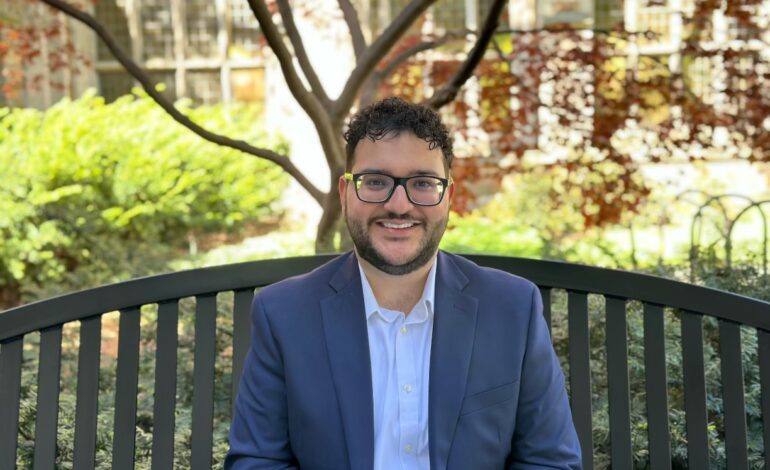DEARBORN — Dearborn native Ahmad Hider is leading an accomplished and decorated academic and professional career.
Hider, a general surgery resident at the University of Colorado and the first in his family to graduate from college, received his B.S. in biomolecular science from the University of Michigan, where he also attended medical school. He obtained his Master of Philosophy degree in translational biomedical research from the University of Cambridge as a Trinity Hall Bateman and Mann Scholar.
“Dearborn has always been home,” Hider, a graduate of Edsel Ford High School, told The Arab American News.
He said his proudest achievement is being the son of his parents, Mike and Asmahan Hider.
“I’ve always appreciated the sacrifices my parents made for me to achieve my successes, which are now their successes as well.”
Pursuing medicine, he said, has been the best route for intertwining his interests in science, people and policy.
“Physicians have a duty in understanding systemic issues impacting our patients and I am fortunate to help play a role in that,” he said.
While in medical school, Hider participated in the Health Policy and Economics Path of Excellence, one of the eight paths of excellence at U of M Medicine, expanding his knowledge regarding health policy, thus equipping him with the tools necessary to be able to adequately yield change in the health care system.
Furthering his involvement in health policy, he interned for the White House Office of Science and Technology’s Cancer Moonshot Team, where he worked to tackle various issues, including public health initiatives and ameliorating access to clinical trials.
Completing his medical degree at U of M, Hider graduated from Alpha Omega Alpha, a national medical honor society and a member of the Gold Humanism Honor Society. He also earned several graduation awards, including the Alexander Blackwood Health Professions Mentorship Award for Medical Students, the Dean’s Award for Research Excellence and the United States Public Health System 2024 Excellence in Public Health Award.
With his work in global advocacy and patient care for cystic fibrosis patients, Hider served as a Clinton Global Initiative University Scholar. With the Cystic Fibrosis Foundation and the Clinton Foundation, he has worked to help and support Cystic Fibrosis patients in allocating the correct treatment and access to care as well as address various other determinants that can improve the health of these patients on a global scale.
“Our general understanding of cystic fibrosis has dramatically improved since the 1930s,” Hider said in a report published on Michigan Medicine’s website. “But if we look at countries like Egypt, Turkey and Ethiopia, for example, they’re categorized as low-to-middle income countries with a life expectancy rate of just 10 to 15 years for individuals with the condition. When we compare this to countries with higher incomes, the life expectancy rates often exceed 50 years of age. Obviously, there is a huge disparity here that needs to be addressed.”
“I’m proud of the work I’ve done around global advocacy and patient care for cystic fibrosis patients with the help of the Cystic Fibrosis Foundation and Clinton Foundation,” he said. “We’ve been able to identify CF patients globally who otherwise didn’t know or have the appropriate treatment for their disease.”
When it’s all said and done, I want to be known not by any of my accolades or titles, but by my genuine love in paying it forward to the next generation.
– Ahmad Hider
Along with his work in global advocacy for cystic fibrosis patients, Hider said he does a lot of surgical outcomes research to discern how to improve patient care from both a technical standpoint and a policy standpoint.
When asked if there was a moment in his path of pursuing medicine that solidified that is where he wanted to be, he recalled a surgery he scrubbed in on, in his first year of medical school.
As a first year medical student, I cold emailed a thoracic surgeon at Michigan, and was asked to scrub in and observe a double lung transplant in the operating room,” Hider said. “I walked in at 5 a.m. and didn’t leave until 8 p.m. that day. Needless to say, many new experiences and mentorships later, I’m now a surgical resident.”
He said he’s worked with national organizations, including the Center for Disease Control and Prevention and the National Institute of Health. He has had work published in the New England Journal of Medicine (NEJM) Catalyst Journal, the Nature Cell Biology Journal and the American Journal of Surgery.
He said that while his path post residency is still forming, he aims to provide the best surgical care while leaving way for his other interests as well.
“When it’s all said and done, I want to be known not by any of my accolades or titles, but by my genuine love in paying it forward to the next generation,” Hider said. “That’s all.”






Leave a Reply